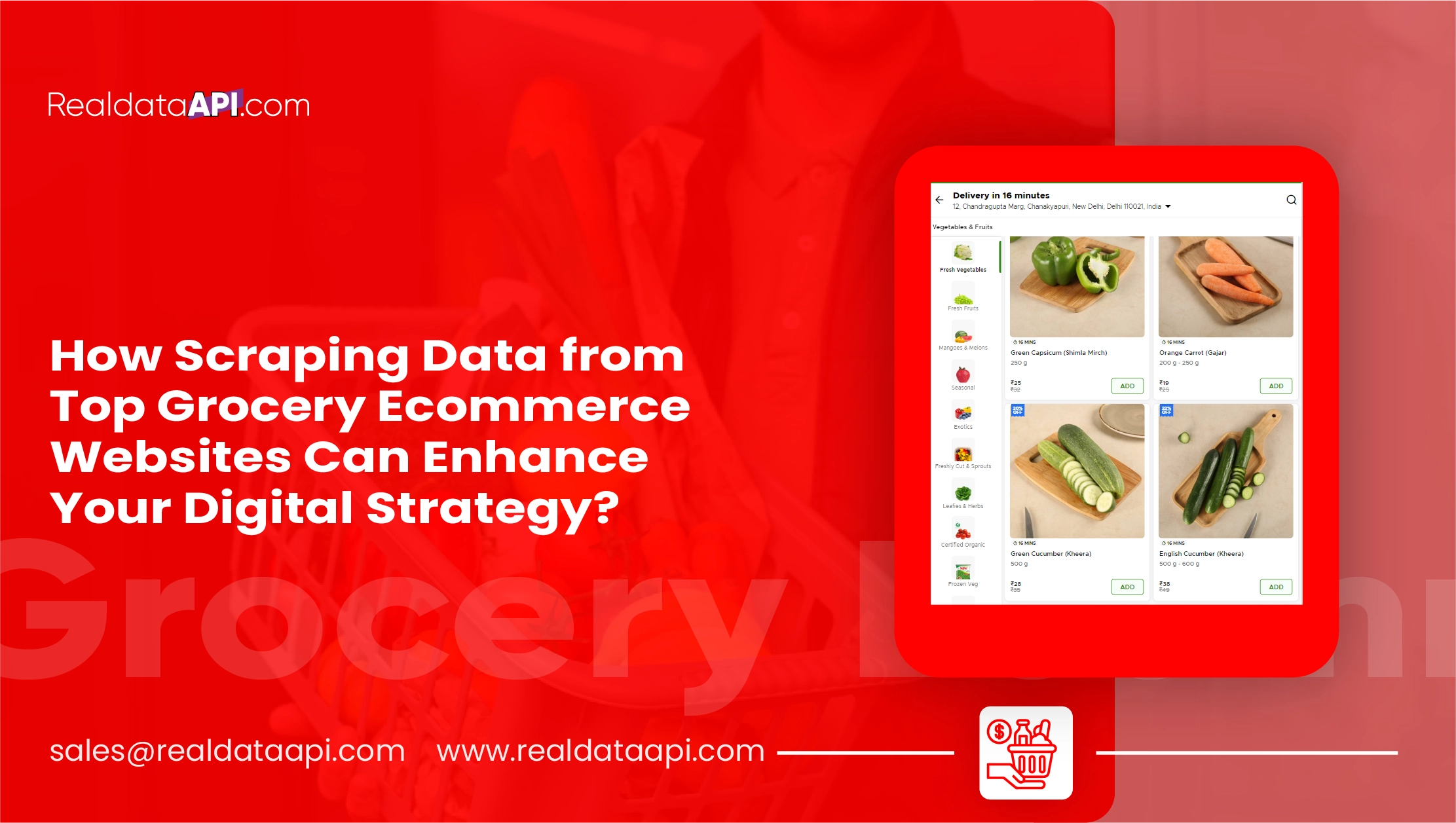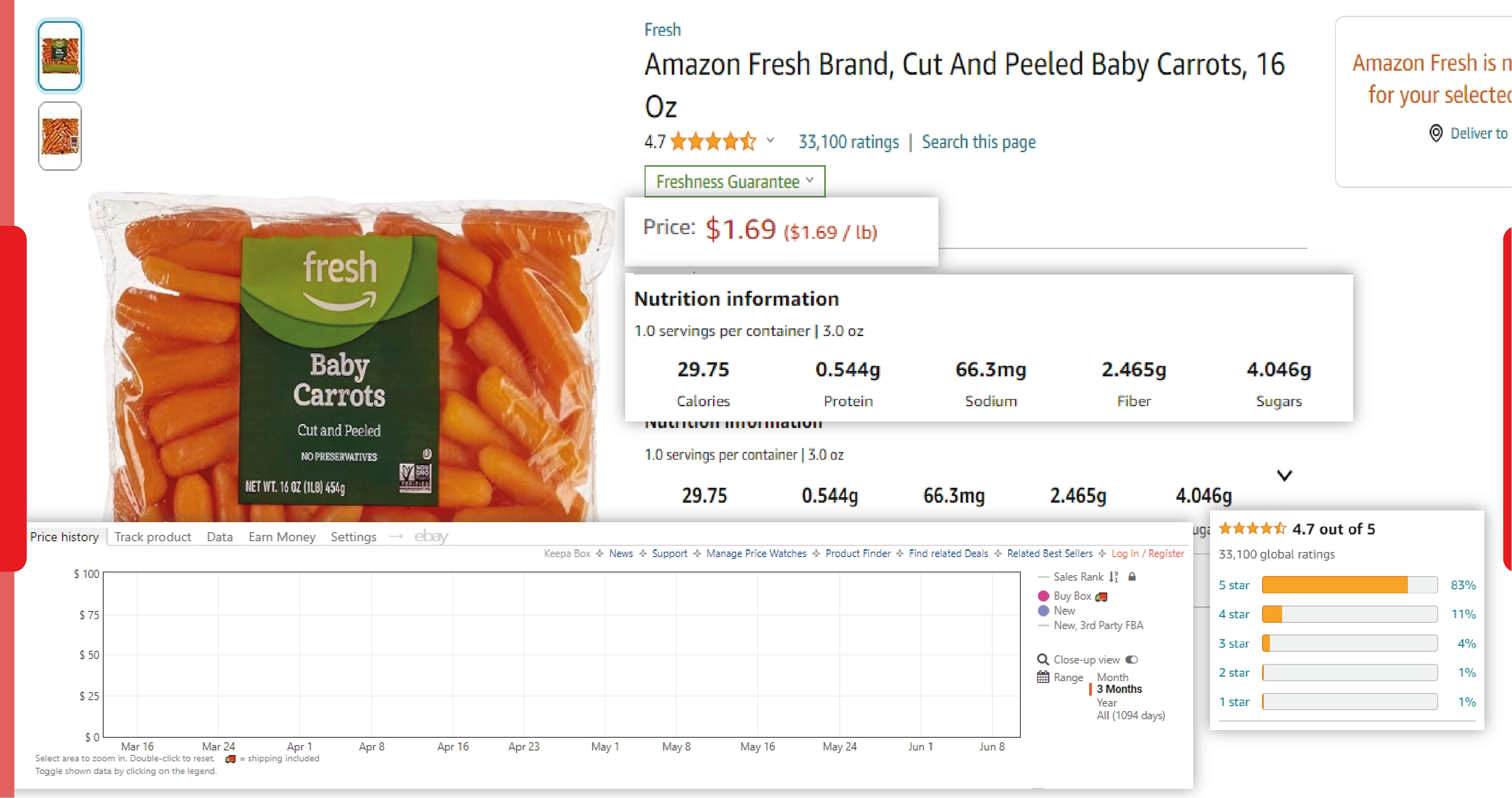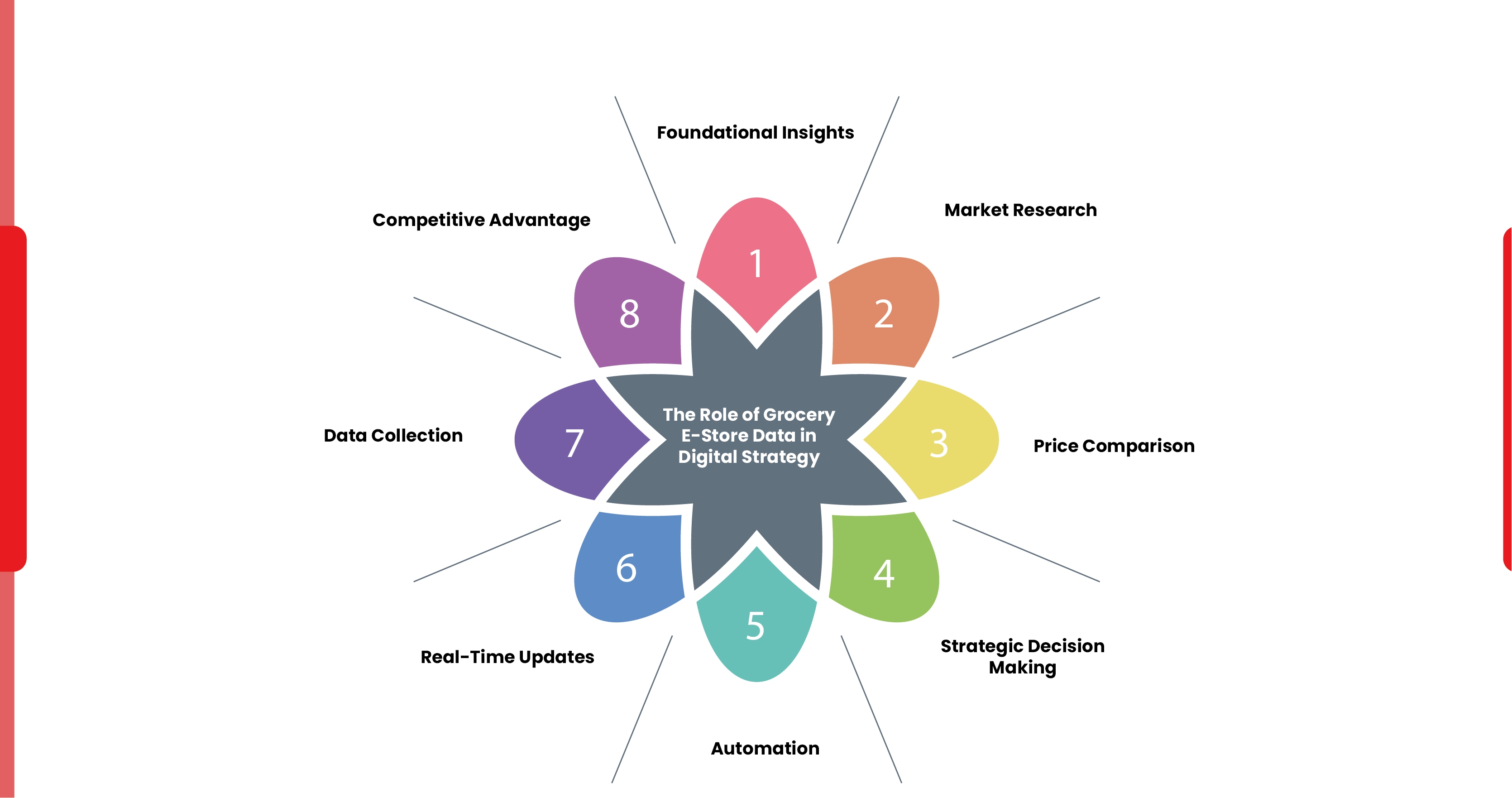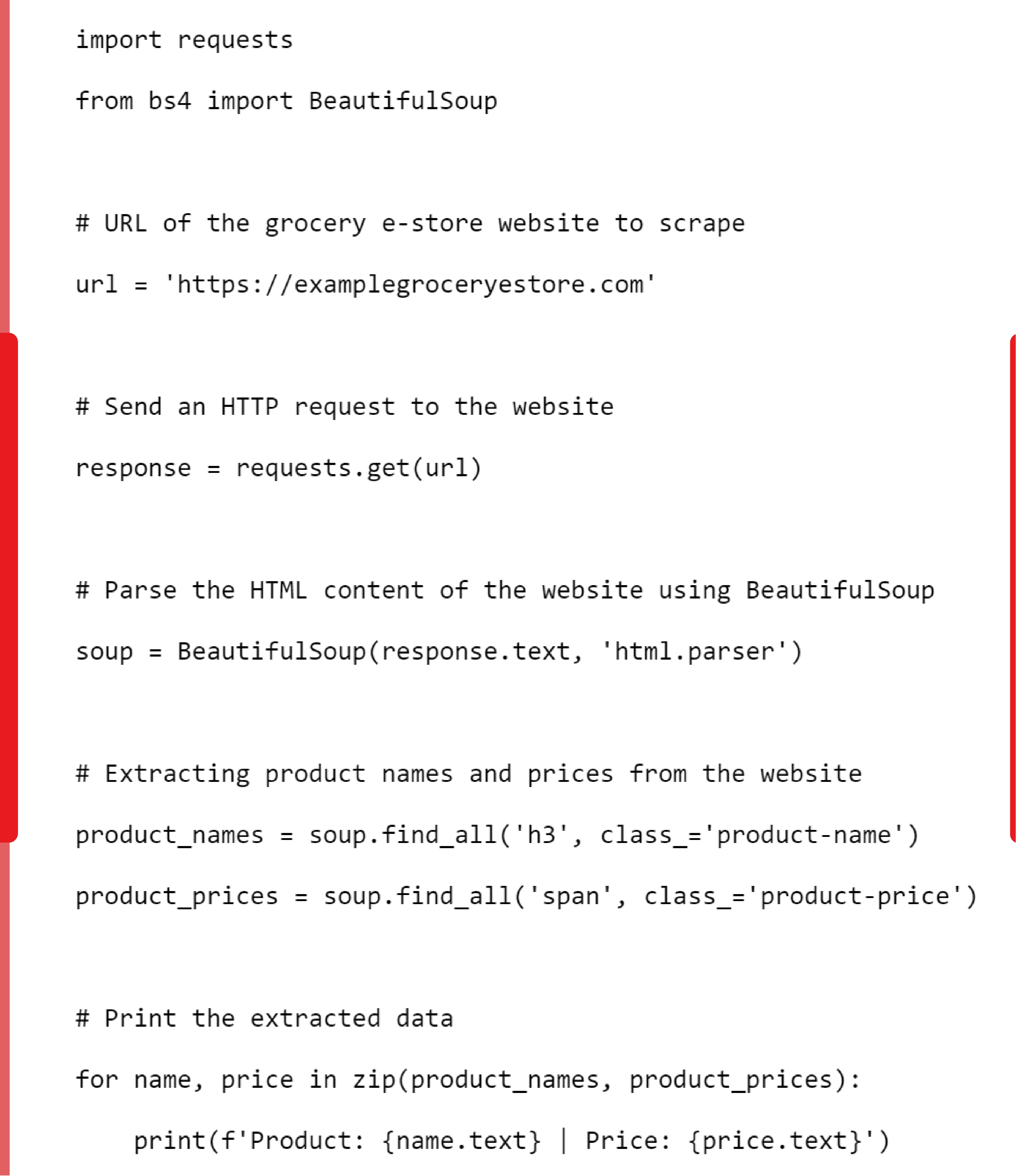

Introduction
In today's digitally driven world, data reigns supreme. For grocery businesses, tapping into the wealth of information available on top ecommerce websites is essential for gaining insights and maintaining a competitive edge. This guide delves into the advantages of scraping data from grocery ecommerce sites, highlighting its pivotal role in digital strategy.
Grocery e-store data collection enables businesses to glean valuable insights into market trends, customer preferences, and competitor strategies. By leveraging web scraping tools like BeautifulSoup and Scrapy, companies can efficiently extract grocery e-store data such as product details, prices, and customer reviews. This data serves as a foundation for informed decision-making, guiding strategies for market research and price comparison.
A grocery e-store data scraper facilitates the extraction of key information, empowering businesses to optimize their product offerings and promotional strategies. With an instant data scraper, retailers can stay agile in responding to market dynamics and customer demands.
Harnessing the power of scraping data from top grocery ecommerce websites is paramount for businesses looking to thrive in the digital landscape. By embracing data-driven insights, companies can fine-tune their digital strategy and stay ahead of the competition.
Understanding the Importance of Data Scraping from Grocery E-Stores

In grocery retail, staying competitive necessitates a deep understanding of market trends, consumer behavior, and competitor strategies. One effective way to gain these insights is through data scraping from grocery e-stores. This process involves utilizing web scraping tools to extract valuable information from top grocery ecommerce websites, providing businesses with a wealth of data for analysis and decision-making.
Grocery e-store data collection serves as the foundation for informed strategic planning. By scraping data from these platforms, businesses can gather crucial information such as product details, prices, customer reviews, and promotional offers. This data acts as a treasure trove of insights, enabling retailers to conduct comprehensive market research and identify emerging trends and consumer preferences.
Furthermore, scraping data from top grocery ecommerce websites facilitates price comparison, allowing businesses to stay competitive by adjusting their pricing strategies in response to market dynamics. By monitoring prices across different platforms, retailers can optimize their pricing to attract customers while maximizing profits.
A grocery e-store data scraper streamlines the process of extracting grocery e-store data, enabling businesses to automate data collection and stay up-to-date with the latest market trends. Additionally, an instant data scraper provides real-time updates, empowering retailers to make agile decisions in a rapidly evolving market landscape.
The importance of data scraping from grocery e-stores cannot be overstated in today's competitive retail environment. By leveraging web scraping tools and techniques, businesses can gain valuable insights for market research, price comparison, and strategic decision-making. Embracing data-driven strategies allows grocery retailers to stay ahead of the curve and thrive in an increasingly digital marketplace.
The Role of Grocery E-Store Data in Digital Strategy

Foundational Insights: Grocery e-store data serves as the bedrock of digital strategy, offering invaluable insights into market trends, consumer behavior, and competitor activities.
Data Collection: Scraping data from top grocery ecommerce websites enables businesses to collect essential information such as product details, prices, customer reviews, and promotional offers.
Market Research: Access to comprehensive grocery e-store data facilitates thorough market research, empowering retailers to identify emerging trends, understand consumer preferences, and anticipate market demands.
Price Comparison: Extracting data from grocery e-stores allows businesses to conduct price comparison analysis, enabling them to adjust pricing strategies in response to market dynamics and stay competitive.
Strategic Decision-Making: The insights gleaned from grocery e-store data inform strategic decision-making processes, guiding retailers in optimizing their product offerings, pricing strategies, and promotional activities.
Automation: Utilizing a grocery e-store data scraper streamlines the grocery e-store data extraction process, enabling businesses to automate data collection and stay updated with the latest market trends.
Real-Time Updates: An instant data scraper provides real-time updates, empowering retailers to make agile decisions and adapt quickly to changes in the market landscape.
Competitive Advantage: Embracing a data-driven approach allows grocery retailers to gain a competitive advantage in the digital marketplace, positioning them for success in an increasingly competitive environment.
Tools for Scraping Grocery E-Store Data
When it comes to scraping data from grocery e-stores, having the right tools at your disposal is crucial for efficient and effective data collection. Here are some of the top tools for scraping grocery e-store data:
Beautiful Soup: Beautiful Soup is a Python library that makes it easy to scrape information from web pages. It provides simple and intuitive methods for navigating HTML and XML documents, making it an ideal choice for scraping data from top grocery ecommerce websites.
Scrapy: Scrapy is a powerful and extensible framework for scraping data from websites. It allows you to build web crawlers that can extract data from multiple pages and websites, making it perfect for grocery e-store data collection.
Selenium: Selenium is a web automation tool that can be used for scraping dynamic web pages. It allows you to simulate a web browser and interact with web elements, making it useful for extracting grocery e-store data from sites with JavaScript-based content.
Having the right tools for scraping grocery e-store data is essential for gaining valuable insights and staying competitive in the digital marketplace. Whether you prefer a code-based approach with libraries like Beautiful Soup and Scrapy, there are plenty of options available to suit your needs.
The Python Code
Below is a Python code example using the BeautifulSoup library to scrape data from grocery e-store websites:

This code sends an HTTP GET request to the specified grocery e-store website, then uses BeautifulSoup to parse the HTML content of the website. It then extracts product names and prices from the website and prints them out. You can modify the code to suit the specific structure of the website you want to scrape.
Remember to replace 'https://examplegroceryestore.com' with the actual URL of the grocery e-store website you want to scrape. Additionally, you may need to adjust the class names used in the find_all() method calls to match the HTML structure of the website.
Conclusion
Scraping data from top grocery ecommerce websites is a powerful strategy for enhancing your digital presence and gaining a competitive advantage in the market. By leveraging insights gleaned from data collection, businesses can optimize their product offerings, pricing strategies, and marketing efforts to better meet the needs of their customers. Embracing web scraping tools and ethical practices can position your business for success in the dynamic grocery industry landscape.
Unlock the potential of grocery e-store data scraping with Real Data API to elevate your digital strategy and drive growth in your business. Start harnessing the power of data today to stay ahead of the competition and meet the evolving demands of your customers!














